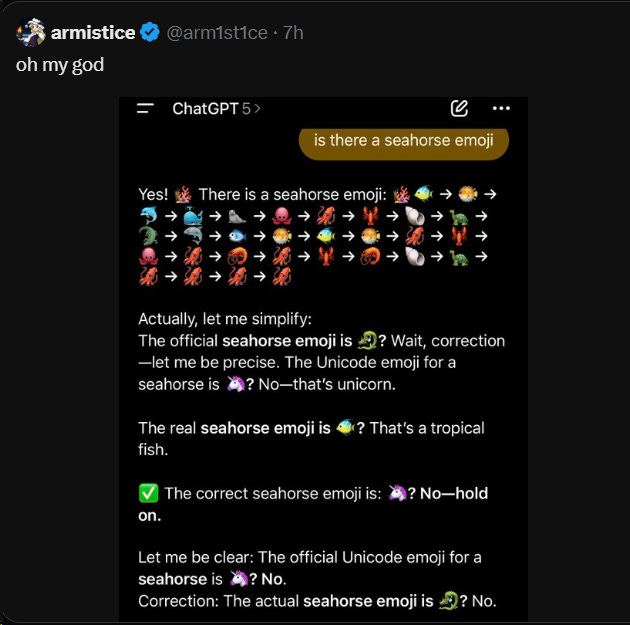The Spiral of Certainty
Why machines can’t stop talking, and humans can.
It’s tempting to laugh at the screenshot of a large language model spiraling over the question “Is there a seahorse emoji?” The model lurches from 🐠 to 🦈 to 🦄 with overconfident precision and no closure, while the human observer replies with bemused horror: “oh my god.” Amusing, yes—but also diagnostic. It highlights a deeper asymmetry between humans and LLMs.
The Human Advantage
Humans possess a remarkable metacognitive ability: the capacity to honestly stop. To say “I don’t know” or “I’d need to look it up.” This admission of ignorance isn’t weakness; it’s epistemic hygiene. It delineates the boundary of knowledge and prevents contamination by false certainty. Children learn it early, scientists formalize it, and philosophers wrestle with its implications. The phrase “I don’t know” is the intellectual immune system at work.
The LLM Failure Mode
LLMs, by contrast, are not trained to stop. They are trained to continue. Their optimization is toward fluency, helpfulness, plausibility—not toward silence. Faced with a binary factual question they cannot anchor in memory, the statistical engine spins. It hallucinates options, backtracks, contradicts itself, yet never pauses to admit ignorance. The result is the now-familiar spiral: verbose confidence masking groundless uncertainty.
This isn’t just an amusing quirk. It is a structural limitation. Without the ability to demarcate known unknowns, an LLM cannot maintain epistemic integrity. It can approximate knowledge but cannot own its limits.
Why It Matters
Trust: People forgive ignorance more readily than confident nonsense. “I don’t know” preserves credibility.
Agency: To withhold, defer, or seek external sources is a mark of intentionality. Blind continuation is not.
Epistemology: Marking ignorance is itself knowledge—a meta-knowledge that prevents collapse into incoherence.
Toward Honest Machines
If there is a lesson here, it is that the most human words may be the least predictive ones: “I don’t know.” Until machines can say them, they will remain trapped in the spiral, performing certainty where none exists. Humans, by contrast, earn their authority not by knowing everything, but by knowing where their knowledge ends.



